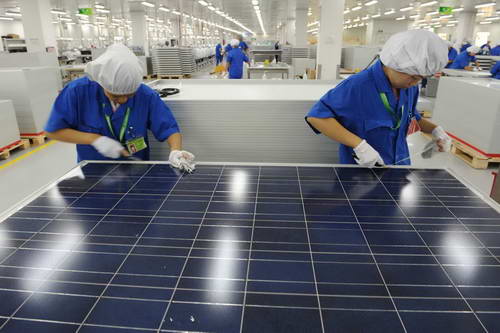-
News >Bizchina
Chint Group to invest in Gansu solar power projects
2010-08-05 10:09BEIJING - Power equipment manufacturer Chint Group Corp said it will invest 22 billion yuan ($3.25 billion) to build two solar power projects in Gansu province to expand its portfolio in new energy sectors.

Workers assemble solar cells at a Chint Group plant in Zhejiang province. [Photo/China Daily]?
Zhejiang-based Chint has signed an agreement with Gansu provincial government to build a solar power plant in Lanzhou with capacity of 1 gigawatt (gW) and a solar module manufacturing venture in the city with initial manufacturing capacity of 200 megawatt (mW), said a company statement.
But the company did not disclose when the project would come on line.
At present, solar power projects completed or under construction in Gansu exceed 100 mW. The investment by the Chint Group would boost those numbers significantly, said analysts.
China plans to develop 13 solar power projects in the western region as part of a government plan to cut emissions and boost energy investment in the area. The government is tendering bids to develop similar projects in six provinces, which will have a combined capacity of 280 mW, said the National Development and Reform Commission in July.
This is the second tender since the country opened bids to build a 10-megawatt solar power plant in Dunhuang in Gansu province last year.
In line with the rapid development of China's solar power industry, an increasing number of enterprises have strengthened their focus in the area. The country has now become a center for the global solar power industry, said analysts.
Some overseas companies are also eyeing the huge market in China. Late last year, Arizona-based First Solar Inc agreed to build a solar power plant in Inner Mongolia together with the local government.However, some analysts are worried about Chint's ambitious investment in solar energy. Shi Pengfei, deputy president of Chinese Wind Energy Association, told China Daily that the cost of solar energy production is even higher than wind energy, which should be carefully considered.
"Compared with cost of 0.3 yuan per kilowatt-hours (kWh) of coal-fired power, the cost of electricity produced by solar power could be as much as 1 yuan per 1 kWh. The government must pay 0.7 yuan to make up for the price gap. I'm not sure whether it is worth doing." Shi said that development of new energy industries cannot follow the rule of "the more, the better".
